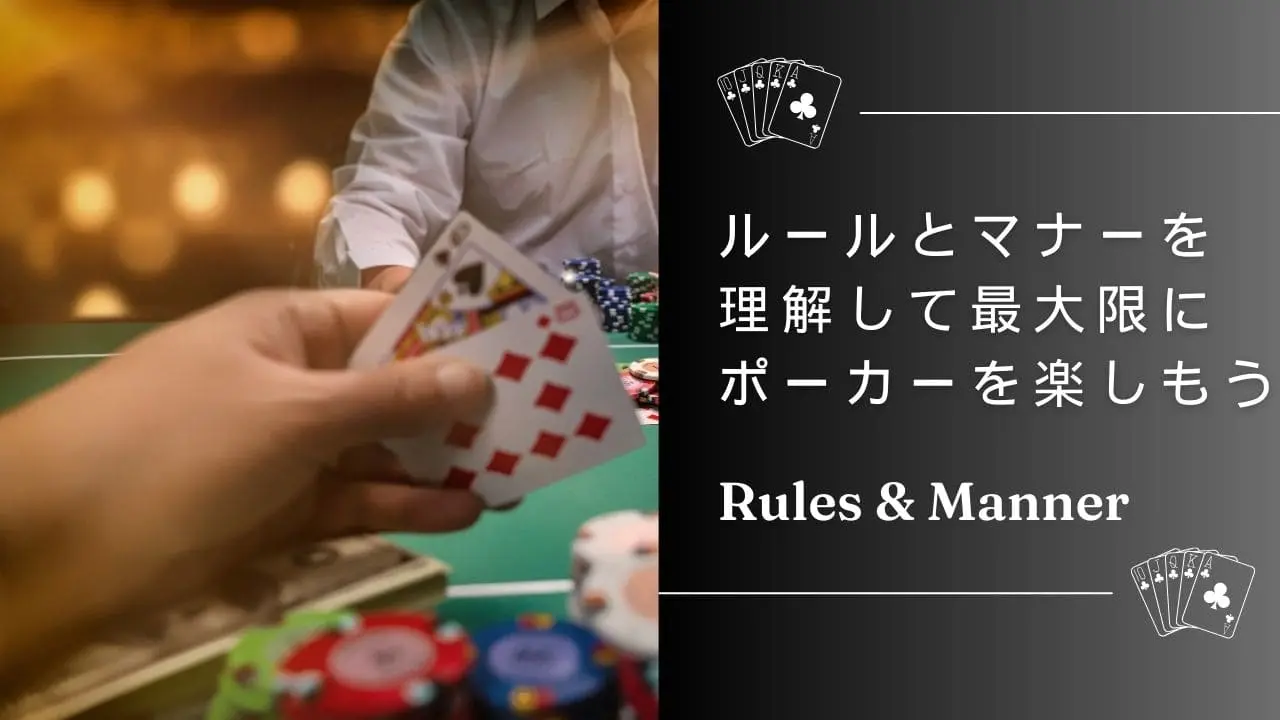Poker is a globally popular card game, but simply knowing the rules isn’t enough to fully enjoy it. Poker combines skill, luck, and psychology, making it a fascinating game. However, to ensure smooth gameplay and avoid conflicts with other players, it’s crucial to follow both rules and etiquette.
In this guide, we’ll cover essential poker rules, etiquette, and online poker-specific guidelines to help you play responsibly and confidently.
Basic Poker Rules
There are various types of poker, but they share fundamental principles. Players bet based on their hands, aiming to create the strongest combination. Popular poker variants include Texas Hold’em, Omaha, and Stud Poker.
Basic Rules of Common Poker Variants
- Texas Hold’em: Each player receives two hole cards and uses five community cards to make the best five-card hand.
- Omaha: Similar to Texas Hold’em, but players receive four hole cards and must use exactly two of them along with three community cards.
- Stud Poker: Some of the cards are dealt face-up, requiring players to analyze visible hands and strategize accordingly.
Below is a breakdown of Texas Hold’em, the most widely played poker variant, along with key online poker rules.
Texas Hold’em Basic Rules
- Blinds: Players take turns posting small and big blinds to start the betting.
- Dealing: Each player receives two hole cards.
- Betting Rounds: There are four betting rounds—Pre-flop, Flop, Turn, and River.
- Showdown: If there is a call after the final betting round, players reveal their hands, and the best one wins.
Online Poker Rules
Online poker follows traditional Texas Hold’em rules but includes unique features. Understanding these will enhance your gaming experience.
- Time Bank: Allows players extra time to think before making a decision.
- Hand History: Players can review previous hands to analyze their gameplay and improve strategies.
- Auto Actions: Players can preset actions such as check, fold, or bet to streamline gameplay.
The Importance of Poker Etiquette
Why is poker etiquette important? Since poker is a social game, good manners help maintain a friendly atmosphere. Following etiquette also ensures smooth gameplay and prevents unnecessary disputes.
1. Proper Table Manners
- Respectful Communication: Engaging in friendly conversation is fine, but avoid excessive talking or disruptive behavior.
- Sportsmanship: Stay composed whether you win or lose. A poor attitude, especially after a loss, reflects negatively on a player.
2. Handling Poker Chips
- Organized Stacking: Keep chips neatly stacked for clarity.
- All-in Declarations: Clearly state when you go all-in and push chips forward properly.
3. Observing Turn Order
- Wait Your Turn: Plan your action in advance and remain patient while others play.
- Act Promptly: Play at a reasonable pace to keep the game flowing smoothly.
4. Showdown Etiquette
- Revealing Cards: The last player to bet or raise should show their cards first.
- Quick Hand Management: Once the showdown is over, move on to the next hand without unnecessary delays.
5. Mobile Phone Restrictions
- No Phone Use While Playing: Using a phone at the table may be considered suspicious and is often prohibited.
- After Folding: You may check your phone after folding, but avoid distractions, especially in high-stakes games or tournaments.
Good vs. Bad Poker Etiquette
- Good: Being respectful, playing fairly, and maintaining a positive attitude regardless of the outcome.
- Bad: Taunting opponents, intentionally slowing down the game, or disrupting play.
Differences Between Tournaments and Casual Games
Poker tournaments require strict adherence to rules and etiquette, while casual games allow for some flexibility. However, regardless of the setting, basic etiquette should always be observed. Additionally, different venues may have dress codes or conduct expectations, so it’s best to check in advance.
Online Poker Etiquette and Rules
Online poker comes with unique etiquette and guidelines, as players do not interact face-to-face. Here are key points to consider:
1. Chat Etiquette
- Be Respectful: Use polite language in chat. Avoid insults, offensive comments, or toxic behavior.
- No Spoilers: Do not discuss ongoing hands or speculate about another player’s cards.
2. Playing Speed
- Act Quickly: While strategic thinking is important, playing too slowly disrupts the flow of the game.
- Use Time Bank Wisely: Utilize the time bank for difficult decisions, but avoid excessive delays.
3. No Multi-Accounting
- One Account Per Player: Having multiple accounts is typically prohibited. Always check the platform’s terms of service.
- Fair Play: Using multiple accounts in the same game is a violation of fair play and is strictly forbidden.
4. No Chip Dumping
- Strictly Prohibited: Chip dumping—deliberately transferring chips to another player—is a serious violation of online poker regulations.
5. Protecting Your Privacy
- Keep Personal Information Private: Do not share personal details in chat or your profile.
- Enhance Security: Use strong passwords, enable two-factor authentication, and consider using a VPN for added security.
Online poker etiquette ensures a fair and enjoyable gaming experience. Even without face-to-face interaction, maintaining sportsmanship and good behavior is crucial.
Conclusion
To fully enjoy poker, understanding both its rules and etiquette is essential. Online poker also comes with specific guidelines that should be followed for a fair and enjoyable experience.
As mentioned at the beginning, poker is a game of skill and strategy. However, practicing good etiquette and fair play enhances the experience for all players. And let’s be honest—winning with honor feels the best!


